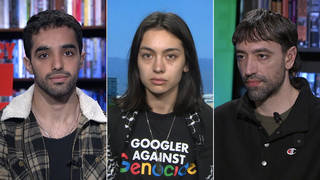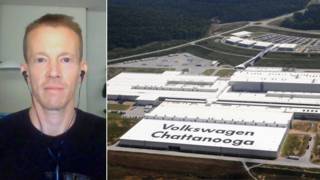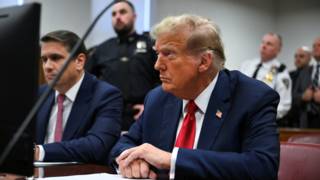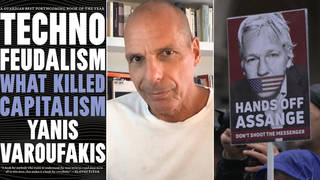
Related
At his first press conference since July, President-elect Donald Trump addressed questions about his business interests and asserted that, as president, he would be exempt from possible conflicts of interest. The Trump Organization is an umbrella company for his hundreds of investments in real estate, brands and other businesses. But Trump said he would not follow advice from ethics experts to divest or create a completely blind trust, and instead announced he will hand over management of the Trump Organization to his sons. The head of the Office of Government Ethics slammed President-elect Trump’s plan to separate himself from his business, calling it “wholly inadequate.” We get response from John Wonderlich, executive director of the Sunlight Foundation.
Transcript
NERMEEN SHAIKH: On Wednesday, President-elect Donald Trump held his first news conference since July. Speaking at Trump Tower in New York, he addressed questions about his business interests and asserted that, as president, he would be exempt from possible conflicts of interest.
PRESIDENT-ELECT DONALD TRUMP: I have a no conflict of interest provision as president. It was many, many years old. This is for presidents, because they don’t want presidents getting—I understand, they don’t want presidents getting tangled up in minutiae; they want a president to run the country. So I could actually run my business. I could actually run my business and run government at the same time. I don’t like the way that looks, but I would be able to do that, if I wanted to. I’d be the only one that would be able to do that. You can’t do that in any other capacity. But as a president, I could run the Trump Organization—great, great company—and I could run the company—the country. I’d do a very good job. But I don’t want to do that.
NERMEEN SHAIKH: Trump’s businesses include hotels, golf courses and buildings around the world stamped with his name. The Trump Organization is an umbrella company for his hundreds of investments in real estate, brands and other businesses. The vast holdings could create unprecedented conflicts of interest. But Trump said he would not follow advise from ethics experts to divest or create a completely blind trust, and instead announced he will hand over management of the Trump Organization to his sons.
PRESIDENT-ELECT DONALD TRUMP: What I’m going to be doing is, my two sons, who are right here, Don and Eric, are going to be running the company. They are going to be running it in a very professional manner. They’re not going to discuss it with me. Again, I don’t have to do this. They’re not going to discuss it with me. And with that, I’m going to bring up Sheri Dillon, and she’s going to go—these papers are just some of the many documents that I’ve signed turning over complete and total control to my sons.
AMY GOODMAN: And then his lawyer spoke. But federal law does not prohibit the president’s involvement in private business while in office, but most presidents in recent decades have placed their personal assets, including property and financial holdings, in blind trusts overseen by independent advisers in order to avoid any appearance of impropriety. On Wednesday, the head of the Office of Government Ethics slammed President-elect Donald Trump’s plan to separate himself from his business, calling it “wholly inadequate” in resolving potential conflicts. This is Walter Shaub, who is head of the Office of [Government] Ethics.
WALTER SHAUB: We can’t risk creating the perception that government leaders would use their official positions for personal profit. Stepping back from running his positions is meaningless from a conflicts of interest perspective. The presidency is a full-time job, and he would have had to step back anyway. The idea of setting up a trust to hold his operating businesses adds nothing to the equation. This is not a blind trust. It’s not even close. I think Politico called this a “half-blind” trust, but it’s not even halfway blind. The only thing it has in common with a blind trust is the label “trust.” His sons are still running the business, and, of course, he knows what he owns. His own attorney said today that he can’t unknow that he owns Trump Tower. The same is true of his other holdings. The idea of limiting direct communication about the business is wholly inadequate. That’s not how a blind trust works. There’s not supposed to be any information at all.
AMY GOODMAN: That’s Walter Shaub, head of the Office of Government Ethics. For more, we’re joined by John Wonderlich, executive director of the Sunlight Foundation.
John, welcome to Democracy Now! Can you talk about what Donald Trump laid out, that he’s handing his business over to his two sons?
JOHN WONDERLICH: Good morning. It’s a pleasure to be here, and I’d be happy to.
We’ve been waiting for some time to find out how Trump was going to deal with the looming conflicts of interest. And yesterday’s update told us what we suspected, which is that he’s not really going to deal with it at all. It’s a pretty stunning rebuke of how we expect the presidency to function and the expectations we have for public service, although it is, unfortunately, legal. There is a loophole in the Ethics in Government Act that means the president can hold outside positions and still own corporations that are active, and maintain all these interests. So, this is really a dismaying situation we’re in, where we have to—where the president is going to be active and have massive debt and be directly involved in this kind of corporate activity. It’s stunning.
NERMEEN SHAIKH: Well, one of the country’s leading constitutional lawyers, Laurence Tribe, has said that “Trump’s announced structure is cleverly designed to dazzle and deceive, but it solves none of the serious ethical or legal issues. … Trump’s lawyer would flunk constitutional law at any halfway decent law school.” So, could you elaborate, John, on some of the most important ethical issues that Trump’s business interests may present?
JOHN WONDERLICH: Sure. So, one of the concerns is self-enrichment. So the president is involved in every decision that gets made about how the country functions, involved at every level of government. And so, his knowledge of his vast business empire and of his debt means that any decision that gets made about taxes or about healthcare or about finance, about bank regulation—all the issues facing the country—have a direct and material impact on businesses that he owns. So that’s one concern, is that he’s going to make decisions not on behalf of what’s best for the country, but with an eye to his business interests.
There are other concerns, too. It undermines the presidency to have even the appearance of corruption. And we now can be confident that everything that happens to President-elect Trump is going to be tinged with an appearance of corruption, because we don’t even know the full extent of his business connections, because he refuses to release his tax returns. So the appearance of corruption is going to be ubiquitous within a Trump presidency.
And then a third level of concern is that by maintaining his business ties, Trump has levers that are not typically available to the presidency, so whether that is paying a private security force, like we know Trump is doing that is displacing the Secret Service’s role, which allows him to do things like eject protesters in a way that maybe the Secret Service wouldn’t do, or who knows what else? Trump is availing himself of levers to power that other presidents don’t have.
AMY GOODMAN: And the—
JOHN WONDERLICH: So I think this is really a crisis.
AMY GOODMAN: The significance of him saying, once again, he has very little debt, when The Wall Street Journal and other publications have said they believe he owes more than a billion dollars to over 150 financial institutions, and what that means if he’s president, John?
JOHN WONDERLICH: Right. It’s certainly hundreds of millions of dollars of debt, and that means that Trump is beholden to the financial institutions that his and our agencies are responsible for regulating. So, any decision that gets made about how these things function, he is obviously going to have a conflict of interest. That’s why it’s recommended that he divest and put everything into a blind trust, so that he’s no longer an agent with this massive network of financial interests. And he has not extricated himself at all from that situation.
NERMEEN SHAIKH: Well, he also said that his company won’t be starting any new business deals while he’s president. Does that make any difference at all?
JOHN WONDERLICH: I don’t believe his—that claim at all. I mean, he said that there would be no new deals at all, and now he’s said there would be no new foreign deals, but there would be some new domestic deals. Also the term “deal” isn’t even defined, so businesses that are active constantly make deals. So, we don’t even know what this term is, “deal.” Trump also promised to release his tax returns throughout the campaign, which he—
AMY GOODMAN: Let’s hear what he had to say about that yesterday at the news conference. Again, Donald Trump on why he will not release his tax returns.
HALLIE JACKSON: Will you release your tax returns to prove what you’re saying about no deals in Russia?
PRESIDENT-ELECT DONALD TRUMP: Well, I’m not releasing tax returns, because, as you know, they’re under audit.
HALLIE JACKSON: But every president since the ’70s—
PRESIDENT-ELECT DONALD TRUMP: Oh, gee, I’ve never heard that. Oh, gee, I’ve never heard that. I’ve never heard that. You know, the only one that cares about my tax returns are the reporters. OK? They’re the only ones.
HALLIE JACKSON: You don’t think the American public is concerned about that?
PRESIDENT-ELECT DONALD TRUMP: But, no, I don’t think so. I won. I mean, I became president. No, I don’t think they care at all. I don’t think they care at all. I think you care. I think you care.
AMY GOODMAN: So, that’s Donald Trump saying he won, so he doesn’t have to release his tax returns. Why is it important, John Wonderlich?
JOHN WONDERLICH: It’s important because we need to have an understanding of the interests of the president of the United States, especially when he has business interests, debt and connections and partnerships with foreign leaders, foreign governments, businesses throughout the economy. We don’t understand what the president’s interests are and who has leverage over him. That’s the situation, and it’s a few days before the inauguration. So, it’s unfortunate that we haven’t managed to have a legal requirement for the president to disclose—or presidential candidates to disclose tax returns. That’s something my organization has advocated for. But we’ve had decades of every president living up to that standard, because our public expectation was so strong. And I think what people didn’t realize is that there’s an opportunity for people to—for politicians to run against democratic norms. And that’s what Trump did.
AMY GOODMAN: Trump said that he was offered $2 billion this weekend, and he turned it down, so we should trust him. What was he talking about?
JOHN WONDERLICH: Yeah, he had this strange early passage in the press conference where he talked about a massive deal that he turned down, as though this brought credit to him because he decided not to go into some massive development deal. It’s pretty disconcerting that he has time to be making—having lengthy conversations about enormous development deals, and not working with his nominees or the Office of Government Ethics, that could have helped him deal with these entanglements. So, it’s absolutely disconcerting.
AMY GOODMAN: John Wonderlich, of course, we’re going to continue to follow this. We thank you so much for being with us, executive director of the Sunlight Foundation.
When we come back from break, we’ll speak with the director of the Committee to Protect Journalists about how President-elect Donald Trump lashed out at reporters at his news conference, slamming CNN as “fake news,” BuzzFeed as a “failing piece of garbage,” and what this means when he becomes president next week. Stay with us.












Media Options